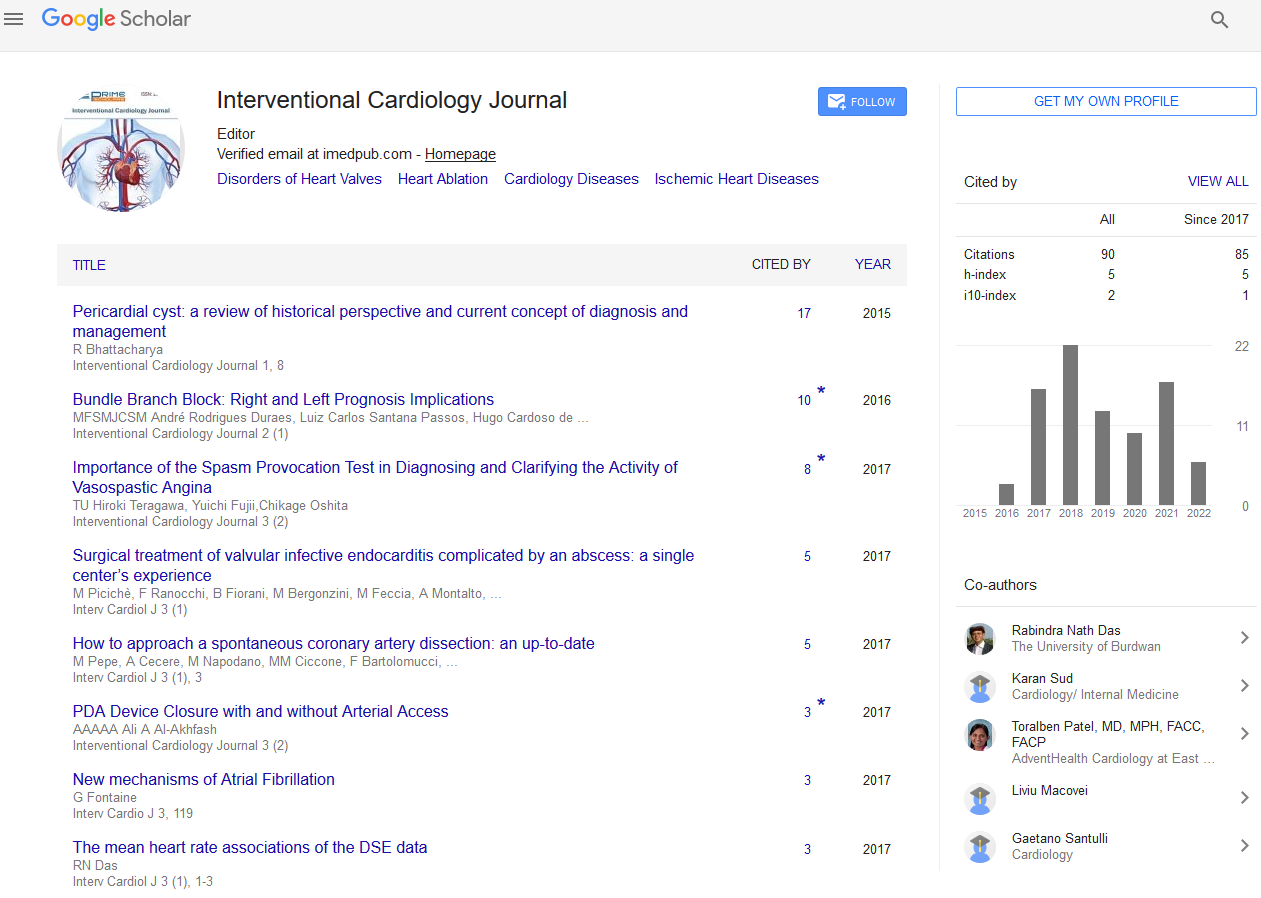Short Communication - (2024) Volume 10, Issue 4
Understanding Heart Failure: Causes, Symptoms, Diagnosis, Treatment, and Prevention
Takeshi Huno*
Department of Cardiology, Sophia University, Japan
*Correspondence:
Takeshi Huno,
Department of Cardiology, Sophia University,
Japan,
Email:
Received: 01-Apr-2024, Manuscript No. IPIC-24-19758;
Editor assigned: 03-Apr-2024, Pre QC No. IPIC-24-19758 (PQ);
Reviewed: 17-Apr-2024, QC No. IPIC-24-19758;
Revised: 22-Apr-2024, Manuscript No. IPIC-24-19758 (R);
Published:
29-Apr-2024, DOI: 10.21767/2471-8157.10.04.31
Introduction
Heart failure is a complex and potentially life-threatening
condition that affects millions of people worldwide. Despite
advancements in medical science, it remains a significant
public health concern due to its high morbidity and mortality
rates. In this comprehensive guide, we will delve into the
various aspects of heart failure, including its causes, symptoms,
diagnosis, treatment options, and strategies for prevention.
Heart failure, also known as congestive heart failure, occurs
when the heart is unable to pump blood effectively to meet the
body's demands. This can happen due to a variety of reasons,
including damage to the heart muscle from conditions such
as coronary artery disease, hypertension, or cardiomyopathy.
Blockage or narrowing of the coronary arteries can reduce
blood flow to the heart muscle, leading to damage and
eventual heart failure. Chronic high blood pressure puts strain
on the heart, causing it to work harder over time and leading to
heart muscle thickening and stiffness. Cardiomyopathy refers
to diseases of the heart muscle, which can weaken the heart's
ability to pump blood effectively. Malfunctioning heart valves
can disrupt blood flow within the heart, leading to heart failure
if left untreated. Inflammation of the heart muscle, often
caused by viral infections or autoimmune diseases, can impair
heart function and lead to heart failure.
Description
Difficulty breathing, especially during physical activity or when
lying down, is a hallmark symptom of heart failure. Reduced
cardiac output can lead to fatigue and weakness, even with
minimal exertion. Fluid retention, often causing swelling in
the legs, ankles, feet, or abdomen, is common in heart failure
patients. Arrhythmias, or abnormal heart rhythms, can occur
in individuals with heart failure. Fluid buildup in the lungs can
cause coughing or wheezing, particularly when lying down.
Diagnosing heart failure typically involves a combination of
medical history, physical examination, and diagnostic tests.
Echocardiogram is an imaging test uses sound waves to create
a moving picture of the heart, allowing healthcare providers to
assess its structure and function. X-ray images of the chest can
reveal abnormalities such as an enlarged heart or fluid buildup
in the lungs, which are common in heart failure. Blood tests can
assess kidney function, electrolyte levels, and levels of certain
hormones that may indicate heart failure. Treatment for heart
failure aims to improve symptoms, slow disease progression,
and reduce the risk of complications. Adopting healthy lifestyle
habits can help manage heart failure and improve overall quality
of life. In some cases, medical devices may be recommended to
support heart function or regulate heart rhythm [1-4].
Conclusion
Heart failure is a serious and potentially life-threatening
condition that requires careful management and treatment.
By understanding the causes, symptoms, diagnosis, treatment
options, and prevention strategies outlined in this guide,
individuals can take proactive steps to reduce their risk of heart
failure and improve their overall heart health. It is important
to consult with a healthcare provider for personalized advice
and guidance tailored to individual needs and circumstances.
If you have been prescribed medications for conditions
such as hypertension or coronary artery disease, be sure to
take them as directed by your healthcare provider to help
prevent complications such as heart failure. Regular visits to a
healthcare provider for routine screenings and monitoring of
blood pressure, cholesterol levels, and heart function can help
identify and manage risk factors for heart failure.
Acknowledgement
None.
Conflict Of Interest
The author’s declared that they have no conflict of interest.
References
- Mosterd A, Hoes AW (2007) Clinical epidemiology of heart failure. Heart 93(9):1137-1146.
[Crossref] [Google Scholar] [PubMed]
- Wilcox JE, Fang JC, Margulies KB, Mann DL (2020) Heart failure with recovered left ventricular ejection fraction: JACC scientific expert panel. J Am Coll Cardiol 76(6):719-734.
[Crossref] [Google Scholar] [PubMed]
- Boorsma EM, Ter Maaten JM, Damman K, Dinh W, Gustafsson F, et al. (2020) Congestion in heart failure: a contemporary look at physiology, diagnosis and treatment. Nat Rev Cardiol 17(10):641-655.
[Crossref] [Google Scholar] [PubMed]
- Greene SJ, Fonarow GC, Butler J (2020) Risk profiles in heart failure: Baseline, residual, worsening, and advanced heart failure risk. Circ Heart Fail 13(6):e007132.
[Crossref] [Google Scholar] [PubMed]
Citation: Huno T (2024) Understanding Heart Failure: Causes, Symptoms, Diagnosis, Treatment, and Prevention. Interv Cardiol J. 10:31.
Copyright: © 2024 Huno T. This is an open-access article distributed under the terms of the Creative Commons Attribution License, which permits unrestricted use, distribution, and reproduction in any medium, provided the original author and source are credited.

